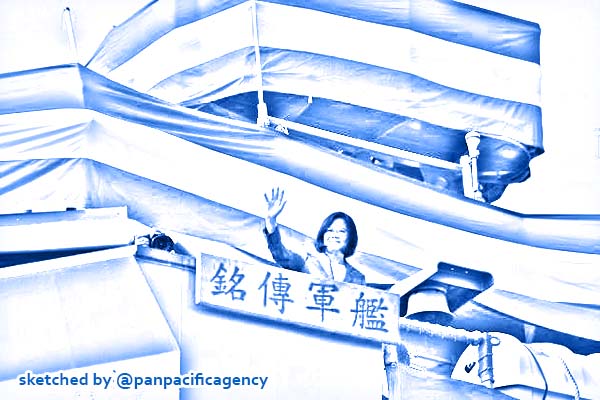Chinese experts urge expediting reunification after Tsai’s win in Taiwan

Taiwan’s President Tsai Ing-Wen waves to assembled guests from the deck of the ‘Ming Chuan’ frigate during a ceremony to commission two Perry-class guided missile frigates from the U.S. into the Taiwan Navy, in the southern port of Kaohsiung on November 8, 2018. Chris Stowers | AFP | Getty Images. Sketched by the Pan Pacific Agency.
TAIPEI, Jan 12, 2020, Global Times. Taiwan’s incumbent regional leader Tsai Ing-wen swept a landslide victory in Taiwan’s regional elections on Saturday, defeating her primary opponent Han Kuo-yu by gaining more than 8 million votes. Analysts from the Chinese mainland forecast more obstacles in cross-Straits relations following Tsai’s reelection, urging more active preparations for reunification, Global Times reported.
Polls closed at 4:00 pm Saturday afternoon across the island, and Tsai of the pro-independence Democratic Progressive Party (DPP) showed early leads as countings began. Han Kuo-yu, candidate of Kuomintang (KMT) and Tsai’s major rival, conceded defeat around 9 pm. And KMT’s chairman Wu Den-yih has tendered his resignation. Tsai gained more than 8 million in the evening as counting continued, surpassing the total votes she won in the 2016 regional elections, which was also the record high.
Analysts from the Chinese mainland believe Tsai’s reelection is a reflection of more young Taiwan residents’ favorable view toward DPP. The combined registered voters stood at 19.31 million, with 16 percent in the age group of 20 and 29 and those from 30 to 39 accounting 18 percent.
Previous opinion polls suggested that Tsai is leading over Han and People’s First Party competitor James Soong Chu-yu, and analysts said a larger turnout of young and first-time voters might have given Tsai an edge, given her high popularity among them, according to Taiwan News.
Her victory emerged from the overall international political climate, as populism has been rising over the years, Li Xiaobing, an expert on Hong Kong, Macao and Taiwan studies at Nankai University, told the Global Times on Saturday. “Months of social unrest in Hong Kong also influenced the island’s mood,” he said.
However, analysts from the Chinese mainland suggested that Tsai should uphold the bottom line, continue focusing on social and economic issues in her second term. If she continues using the external forces like the US in promoting “Taiwan independence,” it would only accelerate the reunification process, analysts warned.
Over the past few years, the regional leader has been adopting aggressive rhetoric and triggering more conflicts between the mainland and the Taiwan island, thus seriously challenging Chinese national sovereignty.
“In 2020, her policies are likely to become more aggressive as she would collaborate more with ‘deep green camp,'” Li said. “If so, the cross-Straits relations will surely face more challenges,” he said.
Tsai’s running mate Lai Ching-te, a vocal advocate for “independence of Taiwan”, is from deep green camp.
However, some analysts were hopeful that this time DPP may adopt a more pragmatic approach by focusing more on the island’s economy and social livelihood. “If the US doesn’t further interfere in the island’s affairs, it is highly likely for the mainland to exercise restraint, and adhere to peace,” Song Luzheng, a research fellow and expert on Taiwan studies at the China Institute of Fudan University in Shanghai, told the Global Times on Saturday.
“The ball is always in our court,” Song said, noting that Taiwan regional leader and politicians should thoroughly take into consideration potential risks before brazenly provoking the mainland.
However, as “Taiwan independence” forces intensify, Chinese mainland officials and analysts have already warned that reunification of the motherland is an inevitable trend regardless of whosoever wins.
Tsai has been repeatedly using Hong Kong’s social unrest to caution the island against the mainland. She even used the slogan “Hong Kong today, Taiwan tomorrow,” during her election bid.
Some analysts also see the Hong Kong card as a major factor behind impelling more young Taiwan residents to cast their votes.
“In her second term, Tsai is expected to be more proactive, so the mainland has to more actively promote reunification,” Li said.